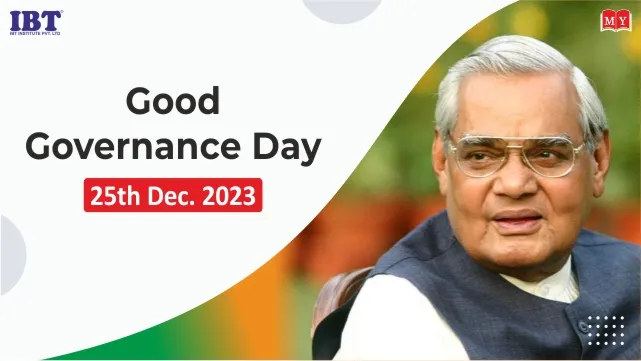
Good Governance Day
Good Governance Day is being celebrated on the birth anniversary of former Prime Minister Atal Bihari Vajpayee . 25th December is celebrated as Good Governance Day every year to create awareness of accountability in government among the people.President Droupadi Murmu, Vice-President Jagdeep Dhankhar and Prime Minister Narendra Modi paid floral tribute to former Prime Minister Atal Bihari Vajpayee at his memorial 'Sadaiv Atal' on his 98th birth anniversary.
8 Principles of Good Governance:
Participation:
People should be able to voice their own opinions through legitimate immediate organizations or representatives.This includes men and women, vulnerable sections of society, backward classes, minorities, etc.Participation also implies freedom of association and expression.
Rule of Law:
Legal framework should be enforced impartially, especially on human rights laws.Without rule of law, politics will follow the principle of matsya nyaya i.e. the law of fish which means the strong will prevail over the weak.
Consensus Oriented:
Consensus oriented decision-making ensures that even if everyone does not achieve what they want to the fullest, a common minimum can be achieved by everyone which will not be detrimental to anyone.It mediates differing interests to meet the broad consensus on the best interests of a community.
Equity and Inclusiveness:
Good governance assures an equitable society.People should have opportunities to improve or maintain their well-being.
Effectiveness and Efficiency:
Processes and institutions should be able to produce results that meet the needs of their community.Resources of the community should be used effectively for the maximum output.
Accountability:
Good governance aims towards betterment of people, and this cannot take place without the government being accountable to the people.Governmental institutions, private sectors, and civil society organizations should be held accountable to the public and institutional stakeholders.
Transparency:
Information should be accessible to the public and should be understandable and monitored.It also means free media and access to information.
Responsiveness:
Institutions and processes should serve all stakeholders in a reasonable period of time.
History of Good Governance Week:
On 23 December 2014, it was decided to honour former Prime Minister Atal Bihari Vajpayee and the late Madan Mohan Malviya with Bharat Ratna.
The government declared December 25, the birthday of former PM Atal Bihari Vajpayee, as Good Governance Day.
In this sequence, organising Good Governance Week was started in the year 2021. The first Good Governance Week was organised from 20 to 26 December 2021.
Benefits of organising Good Governance Week:
Many good results are obtained from the events of Good Governance Week. This creates a greater sense of commitment and solidarity in the government's firm objective of promoting administrative reforms.Administrations at the states, union territories and district levels share the platform with the Government of India. Emphasis is laid on adopting best practices in administration.
 4.5/5
4.5/5








